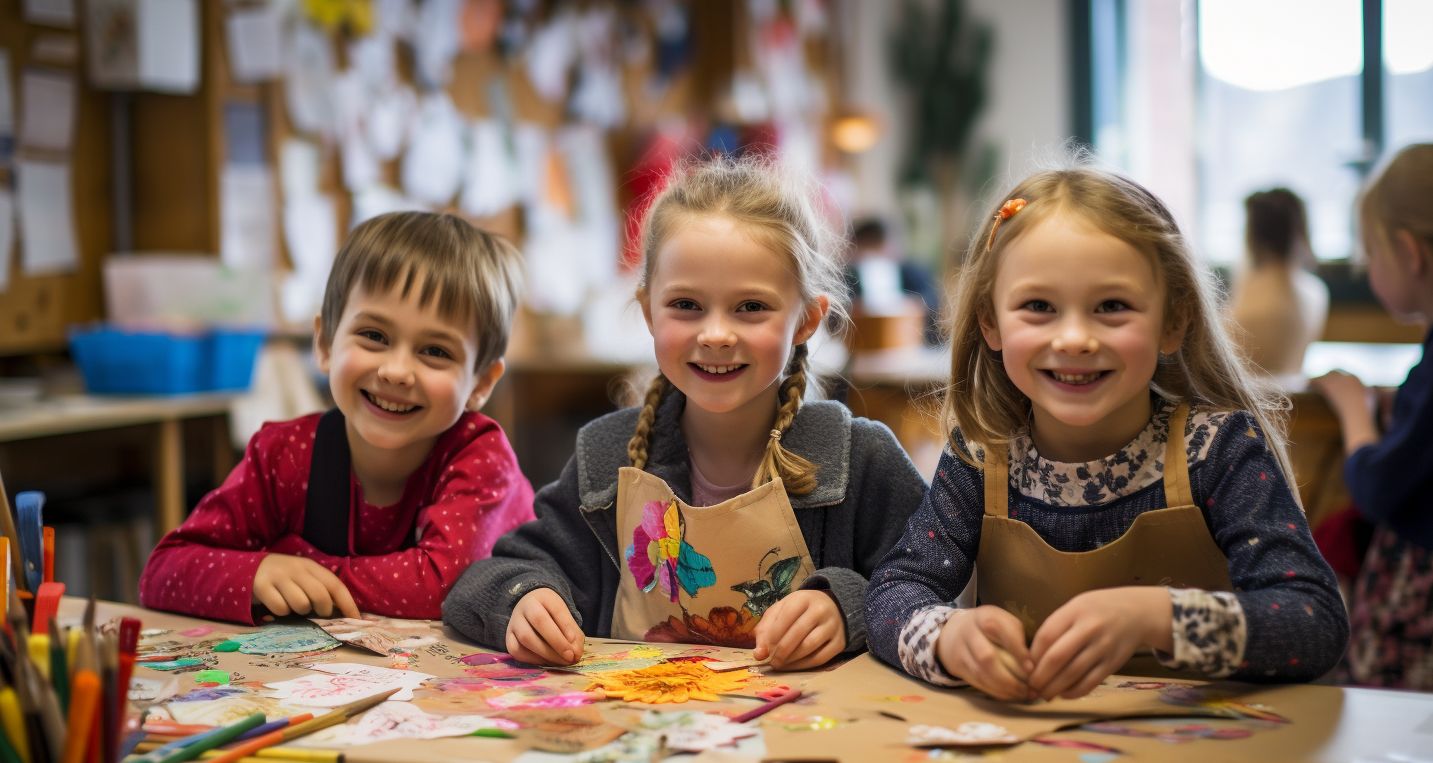
After a long school day, many kids benefit from extra academic support and engaging activities, which is where afterschool programs shine. These programs not only offer a safe haven for kids but also provide a nurturing environment for continued learning and skill development. Starting an afterschool program involves more than just enthusiasm; it demands strategic planning and thoughtful consideration of various elements. In this guide, we will delve into the essentials of initiating an afterschool program. Discover the key components that set apart a high-quality program, and explore the art of developing an ideal curriculum that forms the backbone of engaging and enriching afterschool lesson plans.
Crafting high-quality afterschool lesson plans requires a thoughtful approach that aligns with essential state standards. These standards cover vital areas like child growth and development, administration and management, observation and assessment, and, crucially, health and safety protocols. If you’re looking for how to curate a quality afterschool program, here’s your guide to understanding and integrating these essential elements.
Preparing strong afterschool plans means diving into what the community really needs. It's all about connecting with families, chatting about what they're doing for afterschool care, and figuring out what challenges their kids face. This will allow you to get the scoop on what the kids are into and what's missing from the current options. The goal here is to understand if an afterschool program is a must and, if so, what exactly the neighborhood needs. This helps create a program that isn't just a cookie-cutter solution but something tailor-made to really benefit the kids and families in the community.
Crafting top-notch afterschool plans starts with setting clear goals. Think about what you really want this program to achieve. Are you aiming to boost kids' academic skills or build up their social and leadership qualities? Consider the perks you want to bring to the community and even the financial goals. Writing these down is a game-changer; it helps you map out a plan to reach these targets. Moreover, while you’re setting these goals, it’s essential to keep your students in mind. Not only do they need a safe spot, but also a place to spark their creativity, grow independent, and understand the rules. Good afterschool programs mix study time, fun activities, and chances to socialize. But remember, some kids might need more focus in specific areas. It’s all about finding that balance and altering the plan to fit what these awesome kids really need to thrive.
Selecting the right spot for your afterschool program is crucial. For this, your objective must be to offer convenience – close to schools and easily accessible for parents. While starting with a full-time space might pinch your wallet, here’s a savvy tip to keep you from breaking the bank: lease the space just for the hours you need it. Now, where to look? Community centers, schools, churches, and recreation spots often offer cost-effective options. It’s about being smart with your resources while ensuring the place complies with all health and safety regulations for kids.
Designing top-notch afterschool lesson plans means cooking up a mix of fun activities that match kids’ interests and abilities. Variety is the spice here, so think of activities that are exciting and just right for their age. In addition, remember that involving the kids is key! Let them have a say in what’s on the agenda. When they’re into the activities, they’re more likely to be all in. Plus, checking in with them now and then is also a smart move. Ask what they think and what else they’d love to do in the program. Remember, kids are all different. So, your plan should fit each child’s way of growing—mind, heart, and body. It’s about keeping them engaged and confident as they explore and learn.
Hiring the right team is a key ingredient for a successful afterschool program. Formulate job descriptions that paint a clear picture of the skills and duties to attract the perfect fit for the roles. Think about teachers already in your community who could be golden candidates. With their experience in handling kids and existing bonds with families, they might just fit the bill perfectly. Another smart move is offering specialized training for your staff. It’s like adding extra tools to their kit, giving them more resources to create an amazing afterschool experience.
Continuously improving your afterschool program is as essential requirement to ensure consistent quality. You need to assess that you’re on the right track by checking if you’re following the best practices. Don’t forget to jot down what the kids dig about the program and any valuable suggestions they have. It’s also integral to remembert that it’s not just about the activities. Keep an eye on how the kids are doing. Track their progress on the goals you’ve set and pinpoint where they shine and where they might need a little extra push. These assessments are gold in the sense that they help shape your program and guide how you teach. It’s all about making sure your afterschool plan evolves to fit your students.
The next step in crafting afterschool lesson plans is designing a well-rounded afterschool program curriculum. When piecing together this curriculum, it’s essential to zero in on your values and what you want your program to stand for. Here are a few recommendations you can incorporate into your program for a vibrant, comprehensive, and fulfilling learning journey for your students.
Arts and crafts activities open up a world of creativity and emotion for the kids. Art helps kids let loose, express feelings, and even fine-tune those motor skills. After-school art sessions are a playground of exploration, free from the stress of grades. Think about it: making musical instruments, painting scenes, busting out dance moves like the waltz or the cha-cha slide—these classic ideas are gold for afterschool art programs. You can take the kids outside and let them gather materials from nature for their artwork. Pine needles, sand, pebbles—these elements add magic to their creations. Or you can put on some tunes and ask the students to paint their feelings. It’s all about fostering their imagination and letting creativity soar.

No afterschool program is complete without integrating the wonders of outdoor learning. This type of curriculum is focused on harnessing the natural world to inspire and educate. Picture this as an exploratory odyssey where children engage directly with nature. For example, activities could include identifying various plant species, studying the behavior of insects, or bird watching. Another engaging idea is organizing a nature scavenger hunt, where students search for specific items or observe particular wildlife behaviors. Alternatively, setting up a mini weather station or conducting simple experiments like soil testing can be both fun and educational. These outdoor learning activities go beyond mere playtime. They are instrumental in fostering a deeper understanding of the environment, promoting physical health, and instilling a lifelong respect and curiosity for the natural world in these young learners. For those interested in diving deeper into nature-based education, be sure to check out our comprehensive post on 'Forest School Learning Ideas.' This resource offers an in-depth exploration of forest school concepts, providing a wealth of ideas and inspiration for incorporating nature into education.

STEM curriculum for afterschool programs stands for Science, Technology, Engineering, and Math. Think of it as a journey of discovery where kids get their hands into the nitty-gritty of the world around them. For instance, activities that unravel the mysteries of fossils, rocks, and egg drops. Another excellent idea is challenging students to build a contraption that shields an egg from falls, diving into creating kites, or even crafting a fascinating Rube Goldberg Machine. These activities assist in designing a STEM curriculum for aftershcool programs that isn’t just fun and games. Instead, they also aid in sparking curiosity, and igniting a passion for learning among these young minds.

Global learning motivates kids to explore and take action for a better world. It’s about unveiling the wonders of our world and sparking curiosity about our similarities and differences.
Think of activities that explore where the wind travels or what makes us unique. Teaching basic sign language or a few Spanish words is another fantastic start to broaden horizons.
For the older bunch, you can dive deeper into exploring global issues and encouraging critical thinking. Participate in open discussions on the world’s challenges and inspire these kids to be curious, empathetic, and engaged citizens.
In conclusion, diving into the world of afterschool lesson plans isn’t just about offering extra support, but about shaping young minds and supporting families in a meaningful way.
For those eager to make a difference in education and nurture young talents, starting an afterschool lesson plan with the right afterschool program curriculum can be an incredibly rewarding endeavor.
It’s an opportunity to create a haven of learning beyond the traditional school hours, where kids can flourish and families can find valuable support. So, if you’ve got a passion for education and a heart for children, this could be your chance to make a real impact in your community.
Pembee offers the best class registration and management software designed for afterschool programs, providing support to help them save time on administrative tasks and focus on their students. With our suite of tools, such as custom forms for recording allergies, flexible payment options like bulk payment and installment plans, and seamless scheduling and registration on any device, Pembee can help save valuable admin time. If you are interested in spending less time on administrative tasks and more time on activities you enjoy, consider starting a free 30-day trial or arranging a private demo of Pembee.